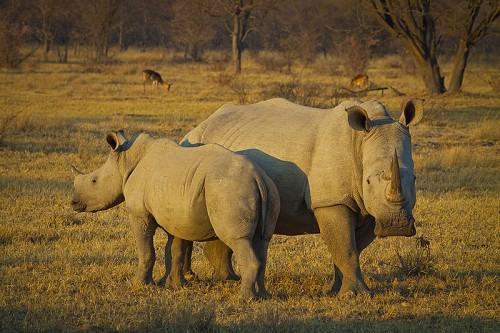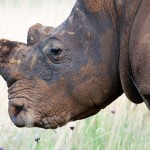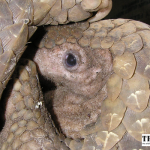Guest Blogger: John M. Sellar, OBE

In late 2011, I retired from the position of Chief of Enforcement with the Convention on International Trade in Endangered Species (CITES). Having served with CITES for 14 years, I know only too well the serious levels of organized and sophisticated crime that are directed at our planet’s wildlife.
There is no better illustration of this than the situation in South Africa, relating to rhinoceroses, in recent years. I share the frustration of many commentators that there seems no end in sight to the ever-increasing poaching of these animals and to the illegal acquisition of their horns; the latter affecting many more countries than South Africa and involving a range of crimes from fraud to burglary.
Consequently, I understand why some people imagine, and are actively arguing, that making commerce in rhino horn legal will pull the rug from under the current criminality, bring an end to the killing of these iconic animals, and potentially bring important revenue for conservation and species management. The points in favour of doing so have been relatively well-made, are relatively convincing, and it seems South Africa’s government may also be leaning towards such a conclusion. However, I think some considerations have, apparently, been overlooked.
It seems that one, if not the, major driver for the current demand is the belief that the ingesting of crushed rhino horn, by sufferers of cancer, will bring them into a state of remission, halt the growth of tumours or, even, cure them. Indeed, it is this trust that organized crime groups are currently exploiting in the most dreadful manner, preying upon those struggling to cope with one of the world’s most awful, and often terminal, diseases. Perhaps, on occasions, rhino horn is having some form of placebo effect. But, if it were truly the answer, would not the major pharmaceutical companies of the world be rushing to sign contracts with those who are offering to shave the horns of animals they own? Since they are not, it seems reasonable to conclude that the efficacy of rhino horn as some form of medicine remains extremely questionable. So, is the intention to replace criminal exploitation with legal mistreatment?
It also all seems to be rather one-sided at the moment. It takes two to tango. Calls for South Africa to propose that CITES authorize commercial exports of legal-origin rhino horn are utterly futile unless nations step forward and identify themselves as possible countries of import. I have yet to hear of any country, whether in Asia or elsewhere, that wishes to seek agreement for its citizens to legally acquire a substance, the use of which has no scientifically-established beneficial effect.
Since the earliest days of evolution, Man’s use of animals and plants has been wide-ranging and often cyclical and fashionable in nature. This, in the case of the rhinoceros, has been demonstrated by the manner in which, in past years, its horn was sought-after for treating fevers in China or as dagger handles in Yemen. In my opinion, we will make a major mistake if we focus on species-specific responses to what our law enforcement community is currently struggling against.
It is organized and sophisticated crime that the anti-poaching parks’ personnel, SARS, SAPS, South Africa’s military, and the country’s national and provincial prosecution authorities are facing. What sort of message does it send to these men and women, many of whom are showing very considerable bravery in the face of heavily-armed poaching gangs, if our answer is to say – “If these people thousands of miles away are stupid enough to want rhino horn, let’s sell them horns”?
Difficult as they may be, violent as they may be, the poaching and smuggling incidents troubling South Africa at present are, in the wider scope of things, skirmishes in a much longer battle against international crime. Organized crime will never be defeated by legalizing the crevice into which its tentacles are today reaching. The tentacles will simply move elsewhere. They need to be amputated, if the crime networks are to be conquered.
Whilst I may empathize with those who feel that South Africa is currently fighting alone, and who may be prompted to look for options to make life easier, I cannot agree with them. Yes, other nations must do much more than they have done so far and, yes, there has to be considerably more effective transnational collaboration and coordination in bringing wildlife criminals to justice. Especially because this is not just about rhinos. South Africa is not alone and rhinos are not the only species that is suffering. Elephant populations, for example, are being decimated in parts of Africa, prompting Ban Ki-moon, Secretary-General of the United Nations, to make the following comment in a report to the Security Council last month:
“Poaching and its potential linkages to other criminal, even terrorist, activities constitute a grave menace to sustainable peace and security in Central Africa. In this regard, I urge Governments of the subregion to consider the issue of poaching as a major national and subregional security concern requiring their concerted and coordinated action.”
Legalizing the trade in rhino horn, albeit highly questionable, might lead to a reduction in poaching. Just as legalizing commerce in recreational narcotics might reduce drug trafficking. But neither response will, in itself, make the citizens of the world any safer in relation to organized crime. The species Homo sapiens has to be taken account of too in the ongoing deliberations.
Now is not the time to give the slightest indication that what Parks, Customs, Police, Military and prosecution officials are doing has anything other than our fullest support and that it is anything other than the most worthy of causes. They are not engaged in a war to protect the rhino; they are battling to preserve the rule of law.




